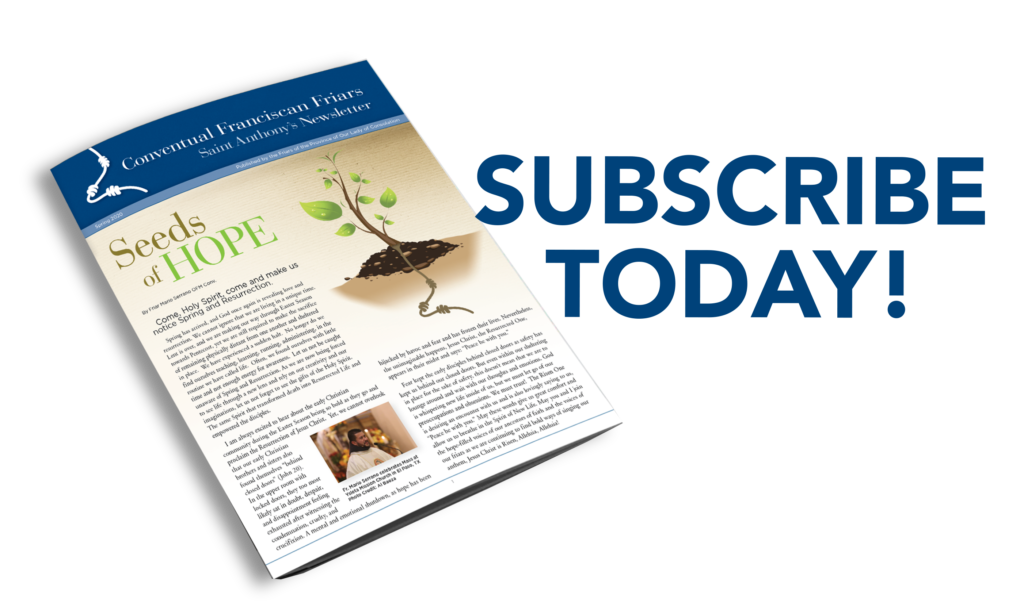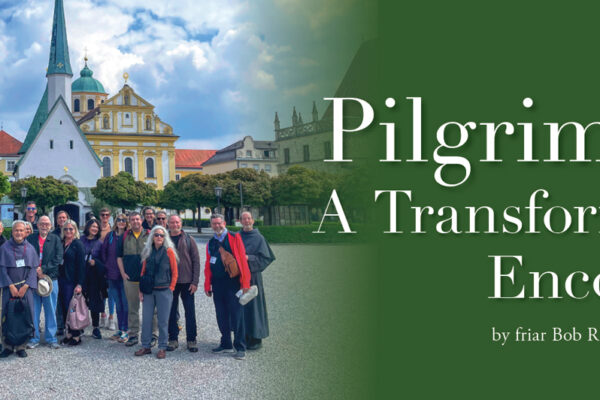by Fr. Martin Day, OFM Conv.

A reflection was given both in Spanish and in English after the Gospel. Fr. Martin takes his turn preaching at daily Mass.
Some years ago the bishops of Spain expressed a desire to provide better pastoral support for pilgrims making their way across northern Spain to the ancient pilgrimage center of Santiago de Compostella, home of the tomb of St. James the Apostle. They invited religious communities to serve in the hostels the dioceses run, especially during the peak pilgrimage months of July and August.
That was how Friar Phil Ley and I found ourselves in Ponferrada, Spain, this July, working at the hostel, or alberguethere. Along with friars from Spain and other countries, we provided pilgrims with an opportunity to reflect on their experiences from a religious perspective.
Those experiences varied widely. Some pilgrims had only the most basic understanding of the role the Camino has played in the life and history of Western Christianity. Others were clearly in the midst of what would be for them a life-changing experience. Some pilgrims arrived after only a few days of traveling the Camino (you can begin your pilgrimage anywhere along the way). Others had been walking for months! One pilgrim I talked with started his pilgrimage in Munich, Germany. He had been on the road for 115 days!

Pandemonium at the albergue's registration desk. Fr. Phil and Fr. Juan Miguel converse with a pilgrim who has just come in off the Camino.
One of our responsibilities was providing sacramental ministry to the pilgrims: being available for confession or pastoral conversation and providing Mass each evening. The Masses were in various languages, depending on who attended. In the weeks that we were there the Mass was primarily in Spanish, with the Gospel being read in both Spanish and English and a brief reflection given in both languages.
In my brief time there I met pilgrims from, among other places, New Zealand, South Africa, Scotland, Ireland, Canada, and of course, the U.S. I even talked with a young man from Louisville who had made a retreat at Mount St. Francis! Many coming from other countries were better at English than they were at Spanish, so they were happy to reflect on their experience in a language they knew and understand at least some parts of the Mass. Little things like that go a long way when you are on the road in a foreign country.

Ponferrada is also home to an 11th century fortress built by the Knights Templar, who took it upon themselves to provide security from bandits for those making the pilgrimage to Santiago de Compostella.
The month was quite interesting and something I would be happy to do again. The biggest frustration was that the pilgrims are only there for one day. There was only one chance to connect with them before they continued on their way. I would have enjoyed the chance to follow up on some of the conversations, but that’s not in the nature of the ministry. It was a good lesson in being open to the grace of the present moment. Perhaps that’s what I needed to take most from my experience along the Caminode Santiago.

Each evening Mass concluded with a blessing of the pilgrims. Here Fr. Martin joins Fr. Juan Miguel (Spain) and Fr. Marek (Poland) in praying over the pilgrims.





